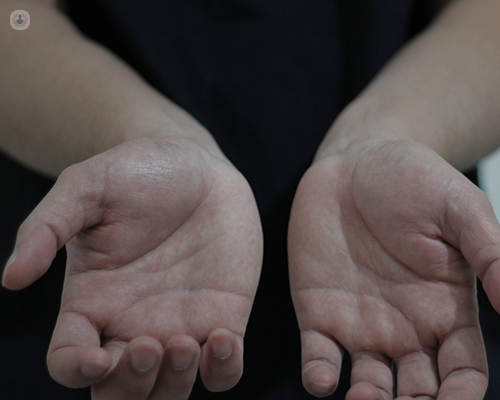5 Q&As on carpal tunnel syndrome
Written in association with:Do you constantly experience pins and needles in the hands, particularly at night? These symptoms could indicate the common nerve condition carpal tunnel syndrome. Top consultant orthopaedic surgeon Mr Christopher James, an expert in hand and wrist surgery, explains more...

What is carpal tunnel syndrome?
Carpal tunnel syndrome is a common condition where the median nerve is compressed where the nerve goes through a tunnel into the hand.
Symptoms include:
- pain;
- pins and needles;
- numbness and weakness of some of the small muscles of the hand.
It is common in certain other conditions such as pregnancy, diabetes, hormone disorders, arthritis and following injury, especially wrist fractures.
The majority of cases just happen without any specific cause. Symptoms are often worse at night and patients say that they have to shake the hand outside the bed to relieve them. The exact cause of this is not certain but it probably relates to the fact that the muscles are in a relaxed position and the wrist becomes flexed creating more pressure in the tunnel.
Is carpal tunnel syndrome permanent?
No. Sometimes the symptoms go away completely. Mild symptoms of carpal tunnel often get better with no treatment. Sometimes the symptoms can get better depending on the cause. Carpal tunnel symptoms can often occur during pregnancy and will often get better after delivery.
If patients develop carpal tunnel after fractures of the wrist or other injuries when the swelling goes down the symptoms often get better. Sometimes symptoms are present in patients with thyroid disorders and can improve when the thyroid is treated.
Carpal tunnel syndrome can occur after using vibration tools and can improve when patients no longer use those tools on a regular basis. In severe cases where there are permanent signs such as persistent numbness, paresthesia or wasting of the muscles then it is likely to be permanent.
How can it be treated?
If the symptoms persist then some patients need treatment that can be recommended by a specialist. Wrist splints can help particularly at night. Sometimes a steroid injection into the carpal tunnel can help particularly in mild cases.
The most effective treatment for established carpal tunnel which doesn’t respond to conservative treatments is surgery. The operation is one of the commonest orthopaedic procedures and involves dividing the ligament that goes across the roof of the carpal tunnel.
Surgery is often carried out under local anaesthetic as a day case. Patients have a wound and the recovery is in the region of three to six weeks. If the nerve is very severely compressed then recovery can take many months and occasionally sensation and weakness do not return to normal.
Can carpal tunnel recur after surgery?
It is rare for carpal tunnel to recur after adequate surgical release but on occasion, it can recur and sometimes surgery is repeated. The results of repeat surgery are often not as successful as first-time surgery mainly because of scar tissue and often because the nerve was so compressed before the first operation.
Read more: Carpal tunnel syndrome
What happens if it is not treated?
There are some electrical tests that can measure how the nerve is working and these tests can often help predict the degree of compression. In the early stages with mild changes, symptoms may well recover without any specific treatment. In moderate or severe changes which match the clinical symptoms and signs treatment is often successful.
If no treatment is offered then there can be some permanent damage to the nerve which can result in significant weakness of the thumb with loss of function affecting the fine movements of the hand and loss of feeling of the hand.
If you'd like to arrange a consultation with Mr James regarding carpal tunnel syndrome, visit his Top Doctors profile today.


